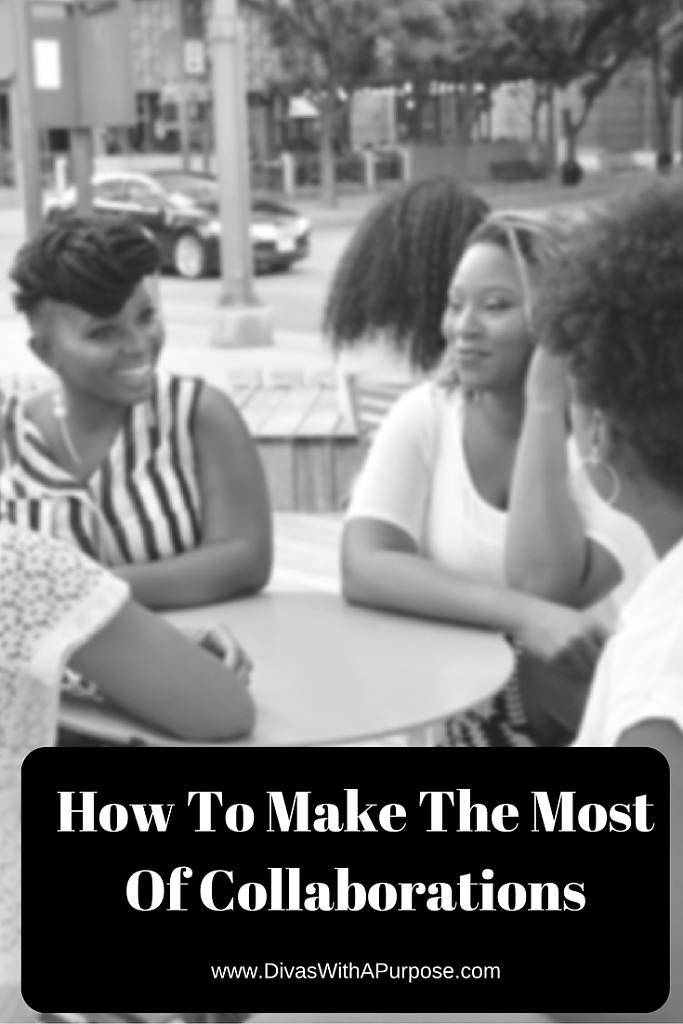How To Make The Most Of Collaborations
I love working with other people. A big part of Divas With A Purpose is connecting and collaborating with fellow women to help one another in our mutual businesses. It has always been a passion of mine and I am ecstatic when I see other women working together successfully.
Most recently I collaborated with 9 other business women to put together an eBook entitled After Why Comes How: Actionable Steps to Reach Your Next Level. It was a fantastic experience and I am proud of the result of us working together.
Whether you are a fellow social media influencer, author, or business owner, it is important to make the most of collaborations you may enter into.

Yes, working with others has its obstacles and challenging moments, but with some planning, patience and cooperation it can be a rewarding experience for everyone.
[Tweet “#NowReading: How To Make The Most Of Collaborations”]
Collaborations can expand your skills set, customer base, and introduce you to projects and people you most likely would not have considered doing solo.
Related Article: Support: It’s A Two-Way Street
Before you participate in a collaboration it is important to consider the reputation of the persons you are working with, their work values, availability, trust factor, and previous experience with collaborations.
Keeping these factors in mind will help to determine and be proactive with any obstacles that may arise working together.

1 – Set clear expectations and guidelines.
Everyone in the collaboration should know what they are agreeing to support, how they are expected to participate and what information they will be responsible for providing.
If you’re unable to fully commit, then don’t. It sounds so simple, but so many people are unable to just say “this is not a good fit for me right now” or “I don’t have time for this in my schedule”.
Document everything. It’s okay to over-document everything. This gives everyone participating something to reference.
Everyone should know who is responsible for what tasks, due dates, and how credit will be attributed and distributed.
2 – Ask questions for clarity.
If you’re unsure about anything – ASK.
3 – Recap expectations, guidelines and deadlines.
See number 1 and repeat. Repetition helps to ensure everyone is on the same page and understands expectations.
See number 1 and repeat. Repetition helps to ensure everyone is on the same page and understands expectations.
(Yes, I meant to write that twice.)
4 – Communicate. Communicate. Communicate.
When working on a project it is important to have communication from all parties involved. Even if you completely understand your roles, expectations, deadlines and are on top of everything, communicating that is important.
Ever sent an email and no one responds? Not even to confirm receipt. Now you’re left wondering if it was received, how it was received, and oh-so-many other questions.
To help alleviate that anxiety from those that you are working with, it is best to reply to confirm receipt of their messages and chime in with any additions or insight from you, if necessary.
The dreaded “reply all” function is a touchy subject – some prefer it because it ensures everyone knows what’s going on and others hate it because it can clog up inboxes.
For me, a general rule of thumb is to use reply all when it is directly related to the conversation topic. If it is an off-subject that does not pertain to everyone than I do not use it.
This could be one of the subjects that everyone can discuss and agree on best practices for the g
5 – All hands on deck.
Collaborate means to work jointly on activity, usually to produce something. From that definition the key words, to me, are work jointly. When you agree to participate in a collaboration you are agreeing to put in work. When it is go time it’s important and essential for everyone to pitch in to help, support and promote, if applicable.
6 – Live and learn.
Remember Maya Angelou’s quote: “When someone shows you who they are believe them; the first time.”
When working with others you get to see and learn more about them – their habits, their work ethics and how they react (or do not react) under pressure.
Not everyone works well together – and that is okay. Collaborations are an opportunity to learn more about yourself, others and how you all work within a team atmosphere.
